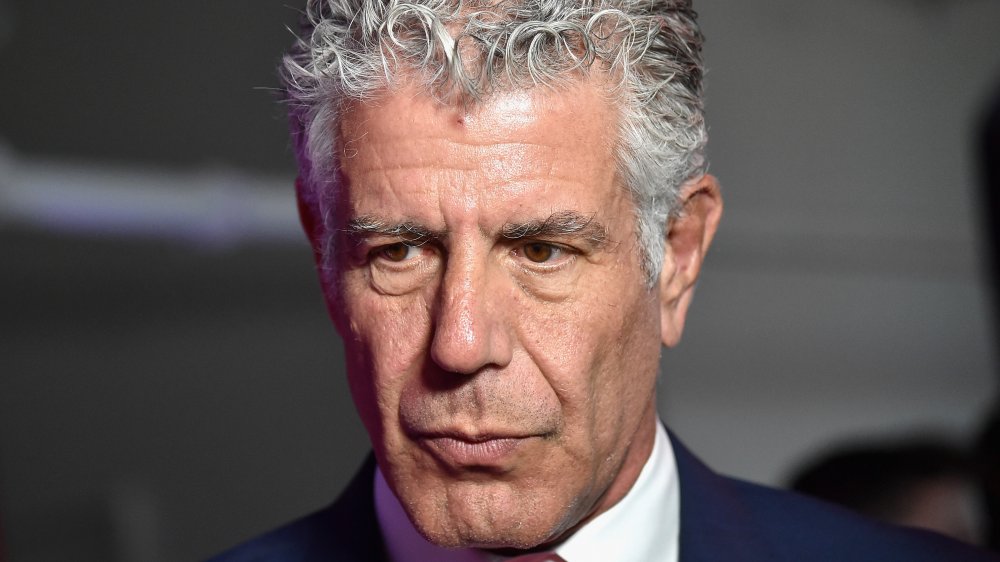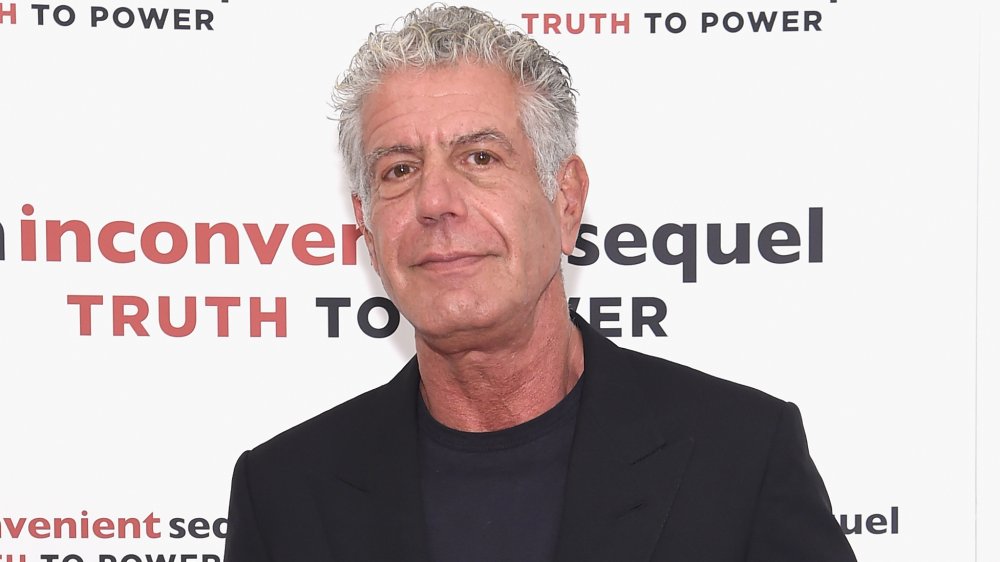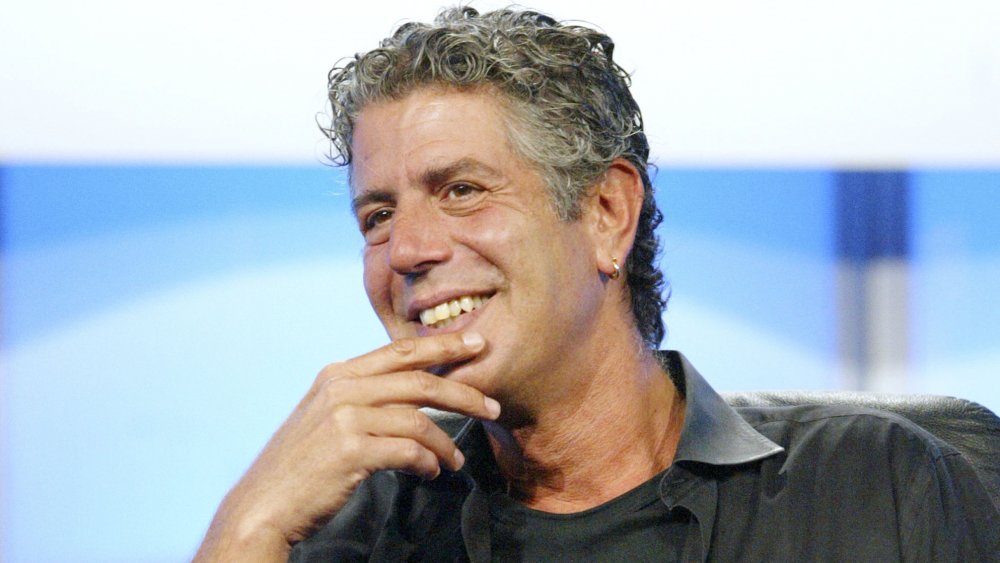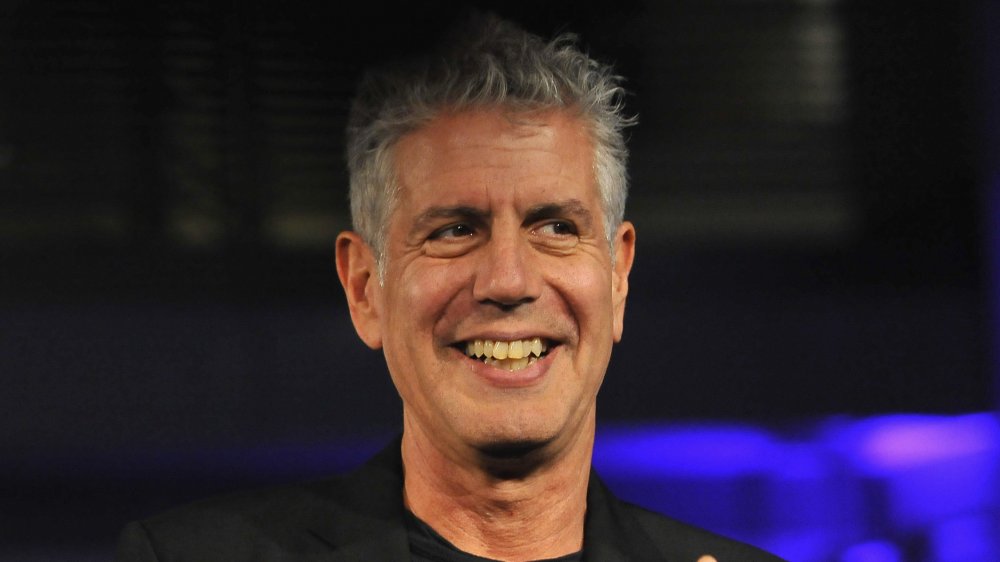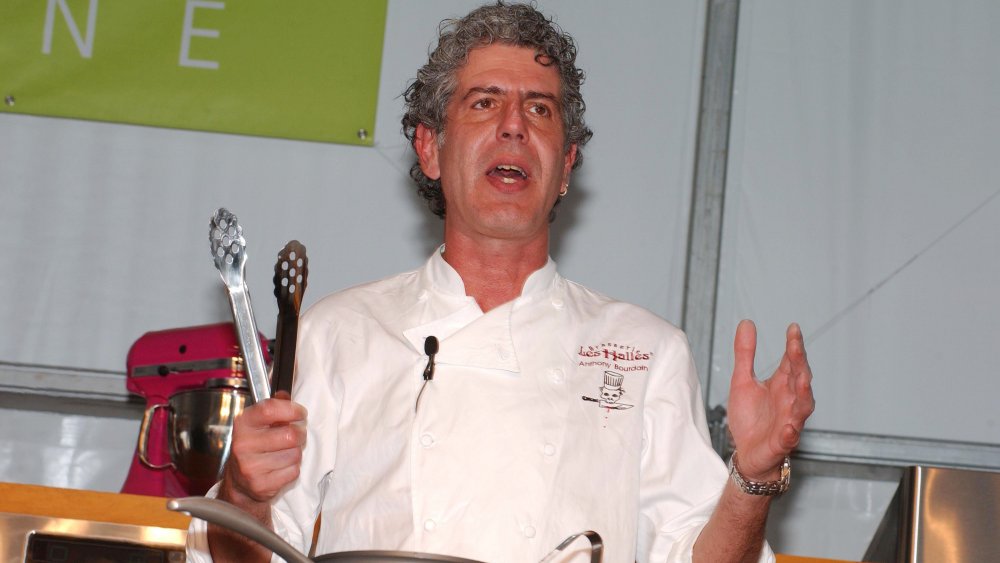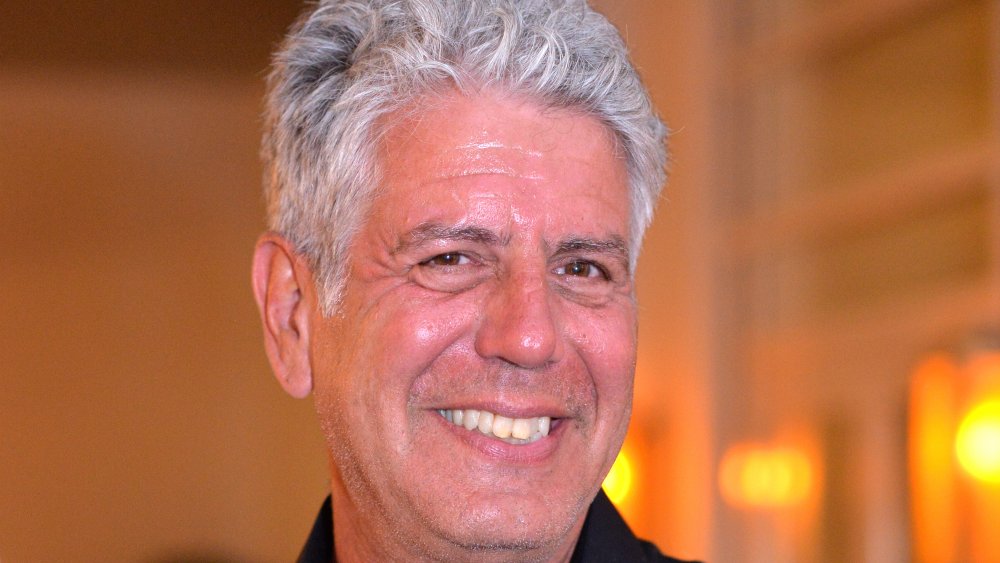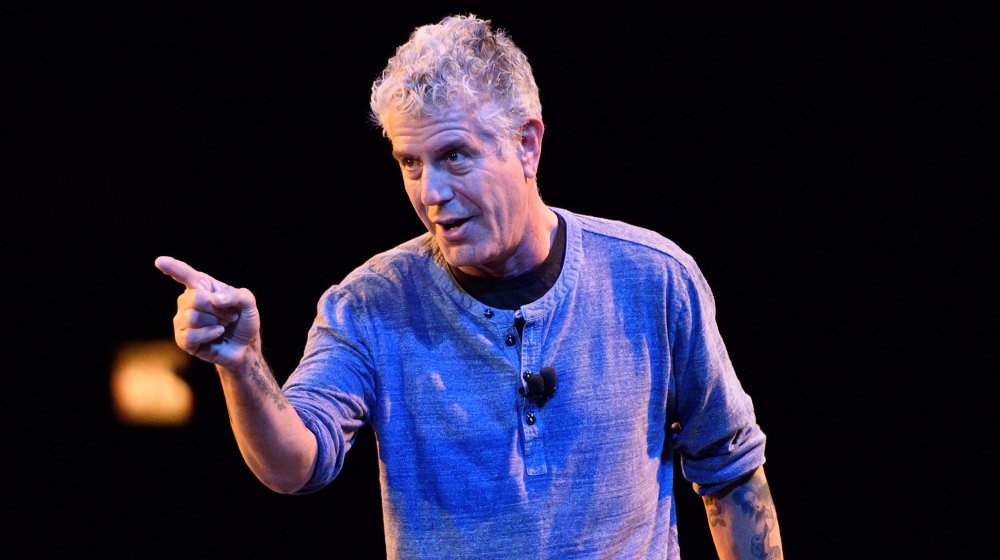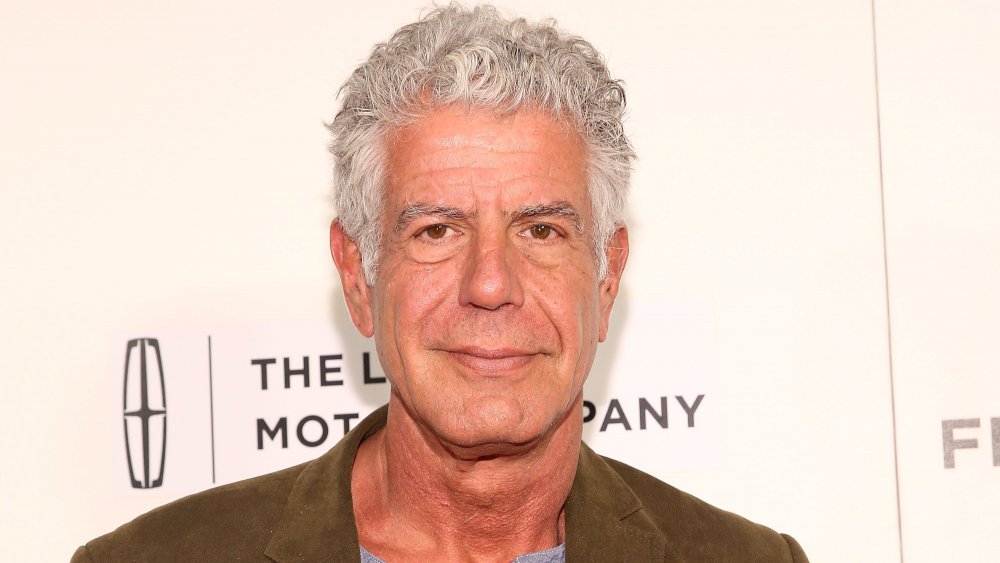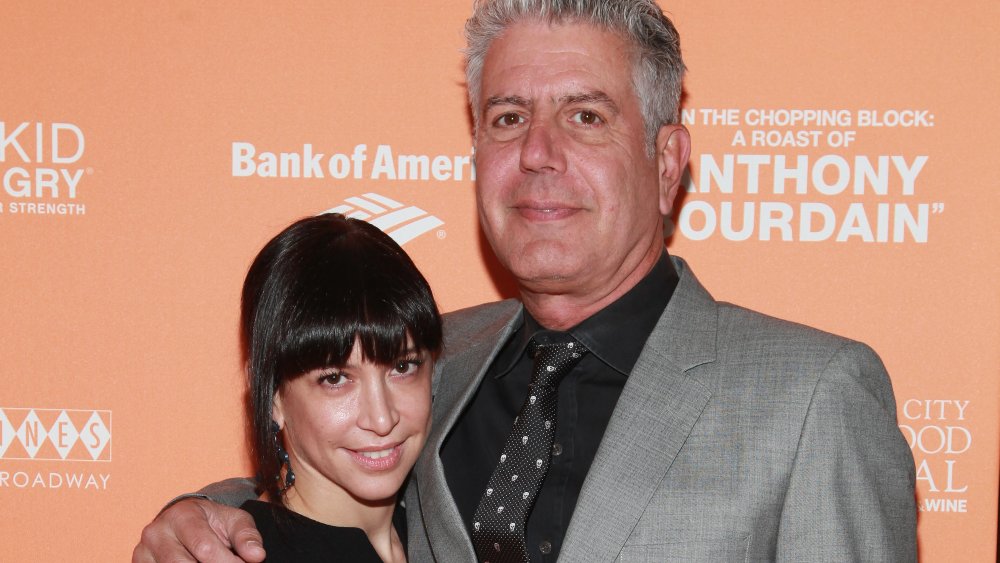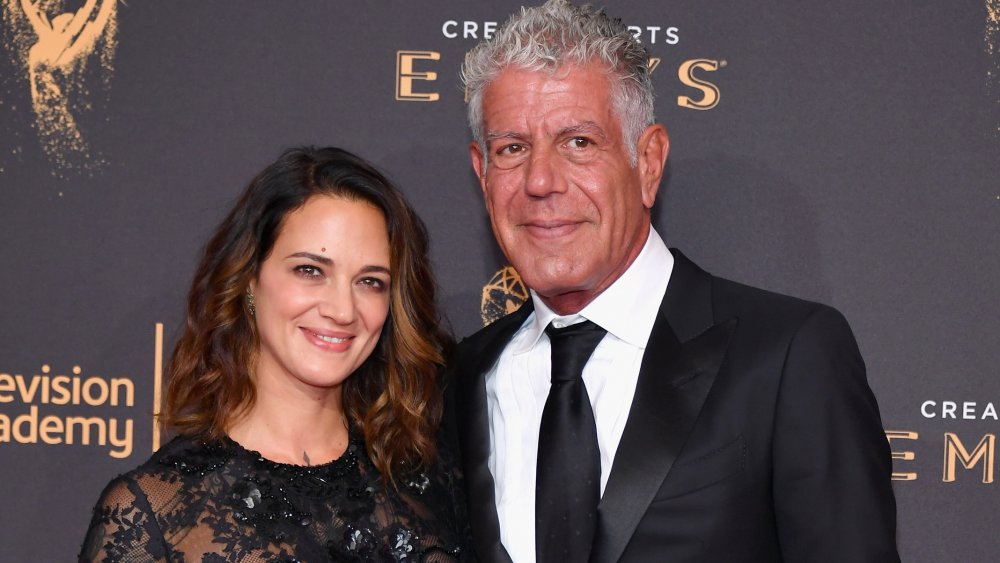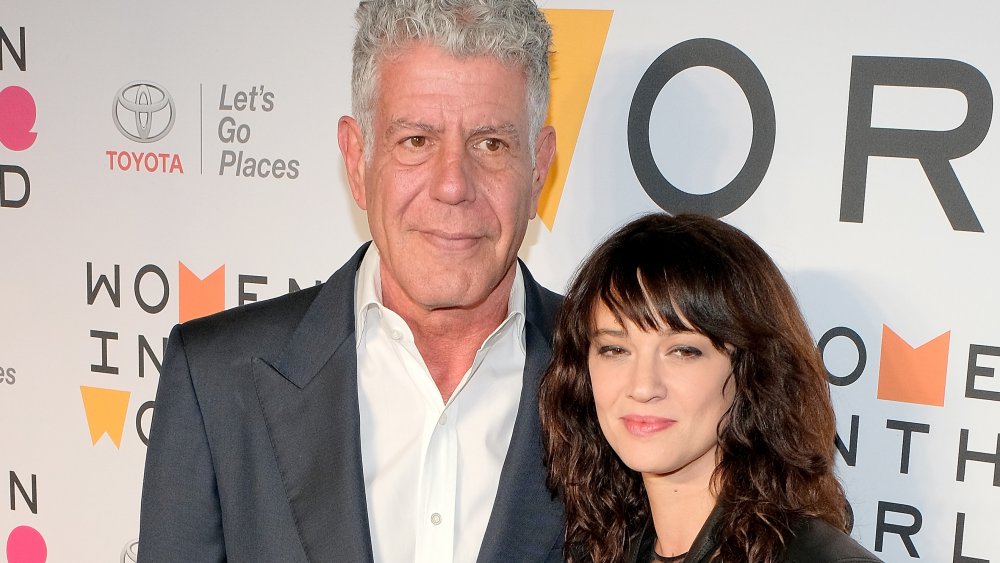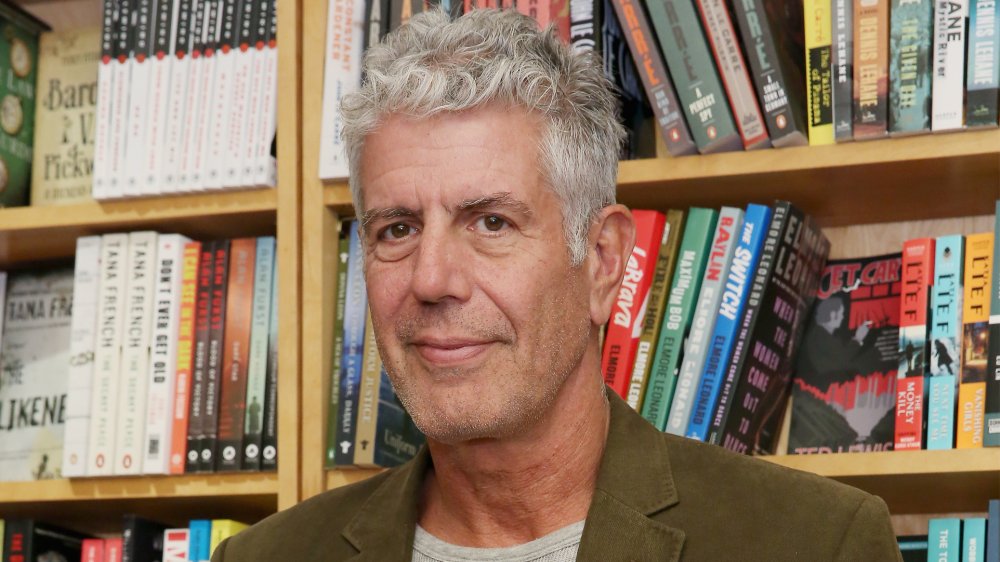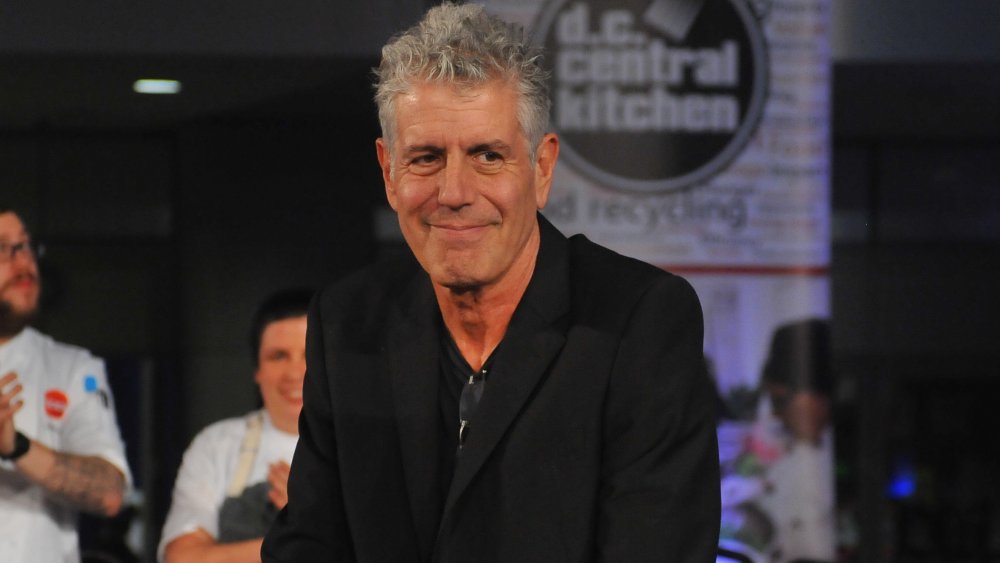Tragic Details About Anthony Bourdain
Anthony Bourdain was one of the most beloved foodies on the planet (with the Emmy Awards to prove it), and a large part of his success can be attributed to the introspective but sardonic way he found magic in the grittiest corners every city he passed through. It wasn't about Michelin stars or high cuisine. The chef didn't buy into food trends or showcase Instagram hot spots. Rather, he was vocal about his fiery disdain for brunch, the kind of hatred that brewed in a soul tasked with cooking 300 omelettes a day.
Bourdain's projects were less about food and more about the human experience, often shedding light on the less privileged class. Whether it was No Reservations or Parts Unknown, his gonzo accounts possessed the kind of sensitivity that made eating a hot dog in the Jersey suburbs feel enormous. He even inadvertently transformed his TV series into an Emmy-nominated war documentary when the 2006 Lebanon War broke out just 24 hours after he landed to film in Beirut. The final scene saw the chef evacuating alongside Marines — a dramatic ending, but one that was entirely Bourdain. It was never about the food, it was always about the way there.
Bourdain's brand of storytelling is only possible from a person who's truly lived — someone who's sunk deep down into the caverns of rock bottom the same way they've risen to the peaks of success. His life may have been marred with darkness, but it was always honest.
One raw oyster defined the course of Anthony Bourdain's life
Much like the never-ending Jerseyite battle between Taylor ham and pork roll, food was a form of rebellion for Anthony Bourdain. The chef had a rather traditional upbringing in Leonia, one that involved spending summers at the Jersey Shore and what we can only assume was the painfully teenaged experience of hanging out in diner parking lots (at least, if he was like every other kid in the state). He only developed his adventurous palette — which expanded far beyond visiting Sheetz instead of Wawa — as a way to rebel against his parents.
In a 2017 interview with The Guardian, the chef admitted that it all began on a family vacation to France, his first time ever in the country. On that trip, both he and his brother were allowed to drink "watered-down wine and cigarettes on Sundays." One day, his parents left both of them in the car while they ate at a restaurant, and he pushed back by "requesting oysters and dishes they found repulsive." He admitted, "It wasn't about the food but about getting a reaction."
In his 2000 Kitchen Confidential memoir (via Page Six), Bourdain revealed that eating that raw oyster was the thing that, as the outlet put it, "scarred him for life." He wrote, "The food, the long and often stupid and self-destructive search for the next thing, whether it was sex or drugs or some other new sensation, would all stem from this moment."
Anthony Bourdain dropped out of Vassar to become a dishwasher
Anthony Bourdain was teased in high school. As his childhood friend, Sam Goldman, told GQ, the world traveler was "tiny," and they "hazed him just a bit" during their ski-club trips, once even making him "ride in the luggage rack." Bourdain eventually graduated and went to Vassar, a private liberal arts college in New York that floats just under the Ivy League — but he was miserable.
Bourdain's brother, Chris, told the magazine that the chef "didn't like [college]" and "didn't care." He added, "I definitely remember, we went to some restaurant in Putnam County, New York, on Route 22, where our parents had a massive, huge f**king argument with Tony: Why are we paying for Vassar? You're f**king up there."
Bourdain didn't end up going back to school. Instead, he searched for a new purpose, later telling The Guardian that he only "became happy" — or rather "intensely satisfied" — when he started washing dishes at a restaurant in Provincetown, Mass. Bourdain was eventually promoted to "dunking fries" and decided that he wanted to pursue a culinary career after witnessing one of the chefs in an intimately awkward — but thrilling — moment: the chef was actively having an affair with a bride by the trash bins "while her wedding party dined inside." Bourdain later attended the Culinary Institute of America, according to USA Today.
Anthony Bourdain quit heroin cold turkey
Anthony Bourdain's memoir, Kitchen Confidential, certainly sheds light on the hedonistic side of New York's 1980s restaurant scene. In his early 20s, the chef worked in SoHo at a restaurant that nurtured the celeb's budding drug addiction — so much so that he'd send a busboy out to Alphabet City to score. Page Six reports that the chef regularly used speed and cocaine during his shifts before eventually graduating to heroin. He even dabbled in crack and LSD during late nights after work, watching punk bands and hanging out at after-hours clubs.
"We were high all the time, sneaking off to the walk-in refrigerator at every opportunity to 'conceptualize,'" Bourdain explained in his memoir (via USA Today). "Hardly a decision was made without drugs." It was undoubtedly a reckless lifestyle — one where Bourdain ran himself ragged to the point that, as he told The New Yorker in a 2017 profile, "I didn't like what I saw in the mirror." Per the outlet, the chef admitted he "ended up on methadone ... unable to leave town without permission, waiting in line to pee in a cup." He eventually quit heroin "cold turkey" in 1987, but spent "several more years" in the throes of cocaine addiction.
Anthony Bourdain spent most of his life flat-out broke
Anthony Bourdain didn't find success until he was nearing middle age, and spent his life in kitchens completely broke. It was bad enough that it actually kept him up at night. In an op-ed written for Wealthsimple in 2017, the chef admitted that he didn't have a savings account until he was 44 years old and didn't have health insurance until around 2001.
After graduating from culinary school and jumping full-time into kitchen work, Bourdain found himself struggling with grueling 12-hour shifts, during which he made only about $120 after taxes, according to CNBC. Around this time, he also spent "a few hundred dollars a week" on weed and often owed money to one of the chefs for cocaine, per Page Six. He was "always a paycheck behind, at least," but that changed after Kitchen Confidential came out in 2000.
"When Kitchen Confidential was published, I hadn't filed taxes in about 10 years," Bourdain wrote (via Uproxx). "I was seriously behind on rent. It had been about a decade since I'd communicated with American Express in a timely manner." He added, "In my daily life, the goal was to muffle the anxiety that I'd feel as I tried to drift off to sleep knowing that, at any point, what little money I had in my bank account could be garnished by the IRS or the credit card company. The landlord could kick me to the curb. That was my reality for many years."
Crack made Anthony Bourdain 'bottom out'
Anthony Bourdain's addiction escalated beyond what he could've ever imagined. In 2017, he admitted to The New Yorker that he "bottomed out on crack." One of his lowest moments, which he rehashed during a Reddit AMA, was when he was so desperate to get a fix that he started digging out white paint chips from the shag rug in his apartment, hoping they were actually bits of crack, and ended up smoking them anyway. Another time, he found himself outside during the holidays, trying to hawk the record collection he cherished just for some cash.
Though viewers saw Bourdain regularly drink throughout his series, when he quit drugs, he quit for good and never looked back. During his Reddit AMA, the celeb chef revealed that he had "never been tempted to relapse," probably because his "experiences were so awful in the end." While writing about his 20-something self, Bourdain admitted, "I was a complete a**hole. Selfish, larcenous, druggy, loud, stupid, insensitive and someone you would not want to have known. I would have robbed your medicine cabinet had I been invited to your house."
Anthony Bourdain opened up about his mental health struggle in an episode of Parts Unknown
Anthony Bourdain's battle with depression is something that plagued him throughout his life. In an interview with The Guardian, he admitted that during his restaurant years, he was an "unhappy soul, with a huge heroin and then crack problem." He carried a lot of shame and regret regarding the people he disappointed and offended during that phase of his life, but darkness followed him well into adulthood, even after he managed to kick drugs.
In 2016, Bourdain gave us a deeper glimpse of his struggle with mental health while visiting Argentina during an episode of Parts Unknown. According to Metro, the chef sat down with a psychologist and revealed that he felt "kind of isolated" and was often triggered by tiny, inconsequential things. "I will find myself in an airport for instance and I'll order a airport hamburger. It's an insignificant thing, it's a small thing, it's a hamburger, but it's not a good one," Bourdain said (via Metro). "Suddenly I look at the hamburger and I find myself in a spiral of depression that can last for days." He went on to note that he felt "kind of isolated."
Anthony Bourdain's mental health took a toll after his first marriage ended
Anthony Bourdain married his high school sweetheart, and in some respects, the pair brought the worst out of each other. According to a profile in The New Yorker, Nancy Putkoski — an older student — "ran with a druggie crowd," and Bourdain liked "dabbling in illicit substances." When the chef graduated from the Culinary Institute of America, the couple moved into "a rent-stabilized apartment" on Manhattan's Riverside Drive, where they lived in a love that Bourdain compared to the one portrayed in the famed film Drugstore Cowboy.
"That kind of love and codependency and sense of adventure — we were criminals together," he told The New Yorker. "A lot of our life was built around that, and happily so." At least until it wasn't. The pair divorced in 2005, which Bourdain called his life's "great betrayal." He sunk into a frightening rough patch, which he described in his 2011 book, Medium Raw (via Page Six). After the split, he jet-set to the Caribbean, where he was "aimless and regularly suicidal." He spent his nights in brothels, getting "the kind of drunk where you've got to put a hand over one eye to see straight." Things only eased up when he met a woman in London. "My nightly attempts at suicide ended," he wrote.
Anthony Bourdain's life of constant travel tore his second marriage apart
Anthony Bourdain's lifestyle ended up taking a toll on his second marriage to mixed martial artist Ottavia Busia. In a 2016 interview with People, he said it was "really tough" constantly being away from his family, estimating that he spent "about 250 days a year" on the road filming his CNN series. Busia also admitted to Page Six that both of their "professional decisions" led them to this sort of "unconventional relationship."
Though Busia and Bourdain share a daughter, they were living "very separate lives" in the years before their divorce — so this breakup wasn't a huge lifestyle change. "As a marriage, clearly it's not ideal but there's no injured party here, nobody's angry, nobody feels like the injured party, nobody feels like a victim. So we'll proceed like that," Bourdain told People, adding that he believed they did "a really good job" as a family and planned to continue to co-parent their daughter.
According to Page Six, the former couple never actually finalized their divorce before Bourdain's death in 2018, even though he started dating Italian actress Asia Argento shortly after their split. However, People reports that this may have not been a top priority because he never planned to marry again.
The truth about Asia Argento's cheating rumors
For fans of Parts Unknown, Anthony Bourdain's relationship with Asia Argento wasn't exactly a major surprise. The chef told The Hollywood Reporter that the pair first met while he was filming the show in Rome, and the chemistry was palpable during the segments they shared. After her appearance, the duo were spotted hanging out on beaches and holding hands through Europe while smoking cigarettes. Though the Daily Mail reports that the couple didn't officially start dating until a year after they met in Italy, that didn't stop the tabloid from speculating that their so-called "crazy" love was somehow concerning to Bourdain's friends.
Page Six reports that five days before the chef's death, a paparazzo caught Argento on what appeared to be a romantic outing with a French journalist. Of course, because of the unfortunate timing, Argento was vilified in the press for somehow contributing to Bourdain's strife — so much so that the pap who snapped the shot even told Page Six that he regretted it.
The truth is that Argento and Bourdain never had a conventional relationship. In an interview with Daily Mail TV, the actress revealed that the pair both cheated on each other and "it wasn't a problem" for them. The couple's friend, Rose McGowan, confirmed this in an open letter (via People), where she revealed the pair had a "free relationship" and "loved without borders of traditional relationships."
Anthony Bourdain helped Ronan Farrow expose Harvey Weinstein
It may seem out of his lane, but Anthony Bourdain actually helped Ronan Farrow expose disgraced movie mogul Harvey Weinstein, who's now serving 23 years in prison. The chef was a vocal supporter of the #MeToo movement, and Asia Argento was one of the very first women to speak out in 2017.
In Farrow's 2019 book, Catch and Kill (via Page Six), the journalist revealed that he was originally reporting on Weinstein's sprawling sexual assault and harassment allegations for NBC, but the network "derailed its publication" (though NBC later claimed the story didn't meet their standards). Bourdain, whose girlfriend was one of the women who opened up in the piece, ended up contacting The New Yorker, the publication that first published his writing in 1999. Explaining Weinstein's abhorrent behavior to editor David Remnick, Bourdain reportedly wrote, "I am not a religious man, but I pray you have the strength to run this story."
When Farrow's exposé was finally published, Bourdain tweeted support for his girlfriend: "I am proud and honored to know you. You just did the hardest thing in the world." Farrow ended up winning a Pulitzer Prize.
Anthony Bourdain reportedly reached out for help before his passing
Rose McGowan was close to both Anthony Bourdain and Asia Argento, especially after the chef's role in taking down Harvey Weinstein. After Bourdain's passing, the actress wrote an open letter to the "behest" of his grieving girlfriend, where she revealed that Bourdain was struggling prior to his death.
Per the letter, which was excerpted by People, McGowan claimed that both Argento and Bourdain dealt with similar mental health issues. "Anthony told a mutual friend, 'He's never met anyone who wanted to die more than him,'" she wrote. The pair eventually both sought help, though McGowan claimed that Bourdain didn't "take the doctor's advice."
"Over their time together, thankfully, [Argento] did the work to get help, so she could stay alive and live another day for her and her children," McGown continued, before alleging, "Anthony's depression didn't let him, he put down his armor, and that was very much his choice. His decision, not hers. His depression won."
Anthony Bourdain's tragic death
In June 2018, Anthony Bourdain was found unresponsive in his hotel room by his friend, chef Eric Ripert, who was working with the chef on an episode of Parts Unknown in France. According to CNN, the 61-year-old star had taken his own life. The chef's mother, who spoke to The New York Times, revealed that Ripert admitted Bourdain had "been in a dark mood" for a couple of days, but the act itself was perplexing.
Since the discovery of his passing, Bourdain's death has been mourned by more than just his close family and colleagues. It's been mourned by an entire world, who watched the chef highlight the strangest pleasures of our existence — from the radio cutting in and out during a solemn, late-night drive through the west Texas desert to the fantastical costumed night clubs hidden behind Tokyo's neon lights. Those things will never be forgotten, and even among the darkness, Bourdain had a sardonic optimism that remains infectious.
"I should've died in my 20s," Bourdain said in a 2016 interview with Todd Aaron Jensen (via CNBC). "I became successful in my 40s. I became a dad in my 50s. I feel like I've stolen a car — a really nice car — and I keep looking in the rear-view mirror for flashing lights. But there's been nothing yet."
If you or someone you know is having suicidal thoughts, please call the National Suicide Prevention Lifeline at 1-800-273-TALK (8255) or text HOME to the Crisis Text Line at 741741.

